Following the conquest of Valencia, El Cid’s wife and daughters were, according to El Cantar de Mío Cid, given escort by Álvar Fáñez and 165 knights as far as Medinaceli. They reached this city within five days of departure and remained there, waiting for further men to come from Valencia and join the escort. The daughters of El Cid passed through Medinaceli on their way to Valencia three years later, though their situation was then very different. They had been dishonoured by their husbands, the Infantes de Carrión.
The kindness of Medinaceli’s citizens must be questioned from a historical point of view, for at the time of El Cid the fortress of Medinaceli was an important Islamic bastion. As a matter of fact, there is evidence that El Cid defeated a warrior from Medinaceli around the year 1067. The battle was most likely motivated by a frontier incident between the town of Gormaz, in control of the Christians, and Medinaceli, under Muslim rule.
References to the village of Medinaceli in El Cantar may be considered anachronistic, since Medinaceli had already been taken by Castilians when the poem was written; i.e. towards the end of the 12th century or the beginning of the 13th century. On the grounds of the poem’s narrative logics and the identity of the travellers, it can be argued that El Cid’s wife and daughters slept in the alcazaba.
No traces remain of the Islamic alcazaba. The current castle was built in the 14th century on the the site of the alcazaba. The walls and exterior turrets of the old castle are well preserved, though the internal structure has been destroyed completely. Nowadays, the town’s cemetery is situated inside these walls.
The castle was located on a strategically important site in ancient times, for it was possible to control the passage through the valley Jalón, which connects Aragón with the centre of the Iberian Peninsula. At dusk the view from the walls are particularly magnificent.
Rev. PAB: 28.12.18









